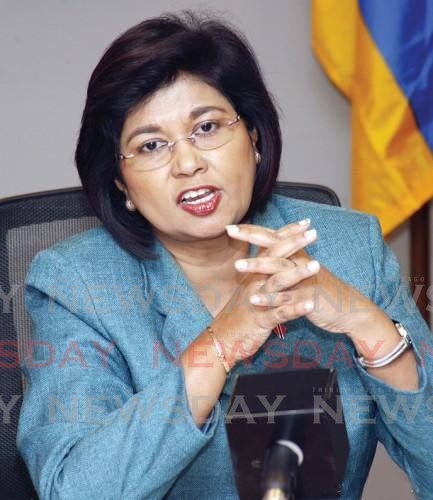Ex-energy minister: 4 divers' deaths at Paria indictment on sector

FORMER energy minister Carolyn Seepersad-Bachan said the horrible deaths of four men who were reportedly sucked into a Paria pipeline last Friday is an indictment on a country with 100 years of experience in the oil business.
She questioned whether all HSE (health and safety) protocols and procedures which were in place before Petrotrin was disbanded had been sacrificed to cut costs and whether any job hazard analysis (JHA) was done before five men dived into the water for the exercise they were hired to do.
One man survived the tragedy. The other four bodies have been recovered.
Commenting on Wednesday, Seepersad-Bachan said given Trinidad and Tobago's history in the industry and that nationals are considered experts, helping to establish industries in other countries, this was “a serious indictment on our energy sector.”
She said her research has not unearthed any similar incident where four men were sucked in at one time happening anywhere else in the world.
“It tells you it is not something that should have happened in the first place.”
She said under Petrotrin, which has transitioned into Paria, HSE protocols had been deeply entrenched for yearsin every procedure, including the maintenance of tho berths/pipelines the five men had been working on.
“This was a periodic maintenance issue, and for this to have happened is alarming, and it speaks to whether Paria is operating with HSE protocols and procedures in compliance with industry standards, (or) whether, when Petrotrin was dismantled, all of those process and procedures went out through the window.”
She recalled before Petrotin was restructured, these were some of the arguments stakeholders raised. but said Government’s focus was on the economic benefits.
“You can’t cut costs to the point where you put people’s lives in danger. To maintain these HSE procedures and protocols is costly, but our industry, even when I was a minister of energy, the number one priority was always lives. In my time we responded not only to lives but to the environment.”
Focusing on the exorbitant salaries being paid to top management, she suggested some of that money should have been used in areas of HSE which had been severely compromised with the absence of a union to advocate for the health and safety of workers.
She said the argument about who is to blame is a moot point, as the company has always taken full responsibility for people’s lives, whether they are contractors or subcontractors.
“That means the company must take full responsibility for ensuring all the employees of the contractors are properly trained where HSE is concerned and that they are certified accordingly.”
It also means a JHA should have been executed before any such procedure, where the contractor and company would have determined all the risk points, how to mitigate that risk, and steps to take, even if that risk never materialised.
“You would have had an incident response time and an incident response plan, where you respond in the shortest possible time – not 48 and 72 hours after, but within an hour.
One of the factors that has been criticised iscommunications, and Seepersad-Bachan underscored the importance of ensuring communications with people under the water.
She also criticised the company for the "inhumane" way the families of the victims were treated.
“That is not normal protocol. Petrotrin always took responsibility for people’s lives – contractors, sub-contractors, whoever else – because the company was held accountable at all points in time.”
As the regulator with HSE as a major part of its line function, Seepersad-Bachan was also critical of the Ministry of Energy's response time.
“A major part of the MOE’s line function is to ensure the industry is operating in accordance with best practices to mitigate all risk with respect to HSE.”
Under her watch, she said, “Every Monday morning we had a departmental meeting, which I chaired as MOE, to deal with HSE issues in the sector, how to continuously improve and ensure that the HSE division at the ministry was complying with what they are supposed to do, including periodic audits."
She questioned whether Energy Minister Stuart Young had ordered any audits at Paria which would have shown gaps.
While she had no problem with the Coast Guard’s involvement in the recovery, she said the MOE should have stepped into the situation earlier and not relied on the CG for an assessment.
“You cannot tell me a country with an industry with so many years of experience and so much expertise and people who we have as deep-sea divers all over the place – when there are operations like this, that we have to depend on the Coast Guard to come in hours after to give us an assessment.
“That is ridiculous. Where is that in-house expertise we had before Petrotrin became Paria? Is it because the capacity was just not there because of cost-cutting?”


Comments
"Ex-energy minister: 4 divers’ deaths at Paria indictment on sector"